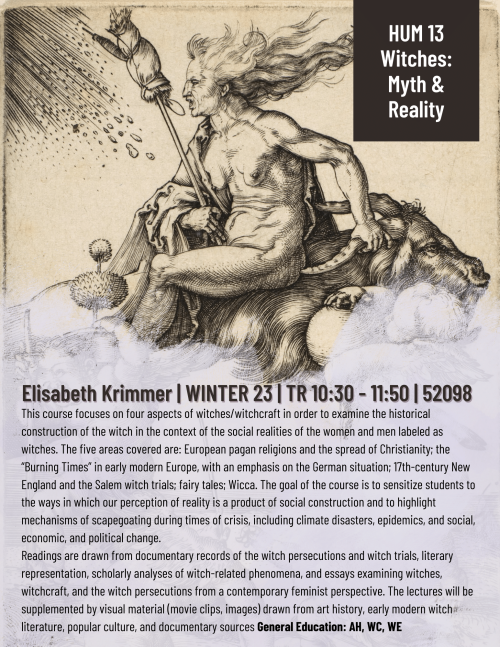Winter 2024 Humanities Courses
-
For day, time, room, and TA information, see our PDF SCHEDULE, or see the course search tool https://registrar-apps.ucdavis.edu/courses/search/index.cfm.
- For all courses not described below, please refer to the General Catalog course descriptions: https://catalog.ucdavis.edu/courses-subject-code/hum/
HUM 013 Witches: Myth & Reality
Elisabeth Krimmer
Course Description:
This course focuses on four aspects of witches/witchcraft in order to examine the historical construction of the witch in the context of the social realities of the women and men labeled as witches. The five areas covered are: European pagan religions and the spread of Christianity; the “Burning Times” in early modern Europe, with an emphasis on the German situation; 17th-century New England and the Salem witch trials; fairy tales; Wicca. The goal of the course is to sensitize students to the ways in which our perception of reality is a product of social construction and to highlight mechanisms of scapegoating during times of crisis, including climate disasters, epidemics, and social, economic, and political change.
Readings are drawn from documentary records of the witch persecutions and witch trials, literary representation, scholarly analyses of witch-related phenomena, and essays examining witches, witchcraft, and the witch persecutions from a contemporary feminist perspective. The lectures will be supplemented by visual material (movie clips, images) drawn from art history, early modern witch literature, popular culture, and documentary sources
Learning Activities: Lecture 3 hour(s), Extensive Writing
General Education: AH, WC, WE

HUM 015 Language & Identity
Eric Russell
Course Description: In this course, we will explore language and different communicative acts that are deemed inappropriate, offensive, or otherwise taboo. Through this, we will come to better understand how these language activities reflect our complex identities, as well as how our attitudes about our own and others' language acts reflects hidden (and sometimes not-so-hidden) power structures. Working together and guided by readings, we will peel back several layers of what may go by unnoticed in day-to-day life, confront some of our own preconceptions about our own and other's language, and begin to understand the ways that language shapes and is shaped by forces such as race, class, gender, and sexuality. Among many of the questions we will explore are the following:
- • Why is it so offensive in our society to talk about some things that other societies find normal or welcome, and the reverse? Why are some words judged to be crass while others, which refer to the same thing are not?
- • How do racialized, offensive insults reflect our society’s construction of power, inclusion, and privilege? What is happening when one or another group of people use these words? And why is it so difficult to come up with an offensive word for those who identify in certain ways, such as "straight white males"?
- • Why are there so many insulting forms targeting women, but relatively fewer that target men? And why do those that insult men frequently associate them to women, but the reverse doesn’t seem to be true?
- • Who gets to decide what language is “right” or “wrong”? What happens when some speakers decide to not follow hidden social rules, for example reclaiming words like slut or WAP? What does this suggest about the ways our society is configured?
Please note! You will be expected to confront words and expressions that can be offensive or shocking, and to do this with as much critical thinking and intellectual acumen as possible. Much of the language we will examine and discuss is offensive and shocking, to me as well as the vast majority of participants in our class. This is important, however: our intent will never be to offend or shock. Our goal is to explore these very real facets of our experience and understand them better - and perhaps even see how they might be disrupted
Learning Activities: Lecture/Discussion 3 hour(s), Extensive Writing 1 hour(s)
General Education: AH, SS, WE
